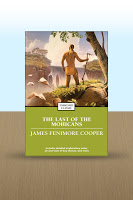
Well, this one is a doozy. I am sorry I could not find you an electronic image of the cover of my edition. It shows the Native American fighting the British guy, and for some reason the wind is blowing up the former’s loin cloth so you can see his butt. Full on, dead centre, a big butt, in the middle of the cover. It is very strange. Very strange. What is that supposed to mean? Borderline gayness combined with borderline racism? Actually, possibly this is also a good strapline for this whole book.
Basically, there are these two British girls and this British guy who is protecting them. They are betrayed by their evil Indian guide(!), Magua. They are then saved by the good Indians(!), a young one (Uncas), his dad, and this other white guy (whose always going on about how he is a man ‘without a cross’) who has been totally absorbed into the Native American lifestyle (thus he has to tell us all the time about his lack of cross). I can see why they made this book into an action movie, because it is just action sequence after action sequence after action sequence, enlivened by a bit of romance and some stupid disguises.
I don’t know which is more racist in its portrayal, the evil Indians or the good Indians. At first I was thinking, wow, way to write to the stereotype; but then I read on the internet that I guess Cooper’s book was actually a huge part of what created the stereotype. Interesting. There’s lots of ‘savage’ this, and ‘uncivilized’ that. But on the other hand, when Uncas dies, his father is mostly comforted by the white guy (WITHOUT a cross, let’s emphasize) who says how they serve the same god and will run on the same paths on the happy hunting grounds, which is sweet. And I guess at the time Cooper wrote it, a lot of people thought he was too kind to the Native Americans, because he often writes in admiration of their fortitude, courage etc etc. So, obviously, let’s not judge him by our standards.
Let’s not even get into the women, because its a close run thing as to whether it’s more sexist than it is racist. And we are not judging him by our standards.
We’re fairly lucky I can even tell you this much about it, as I almost gave up on page 17. This guy is some WORDY. And we know I like wordy, but this was almost too wordy even for me. Check it out: “Receiving no reply to this extraordinary appeal, which, in truth, as it was delivered with the vigour of full and sonorous tones, merited some sort of notice, he who had thus sung forth the language of the holy book, turned to the silent figure to whom he had unwittingly addressed himself, and found a new and more powerful subject of admiration in the object that encountered his gaze.” Ye gods. I kept going, but I almost gave up again when instead of cooking he referred to “undergoing the culinary process.”
Onwards and upwards. (In which series of childrens books is this an important phrase, at least in the last book? Extra points if you know)
